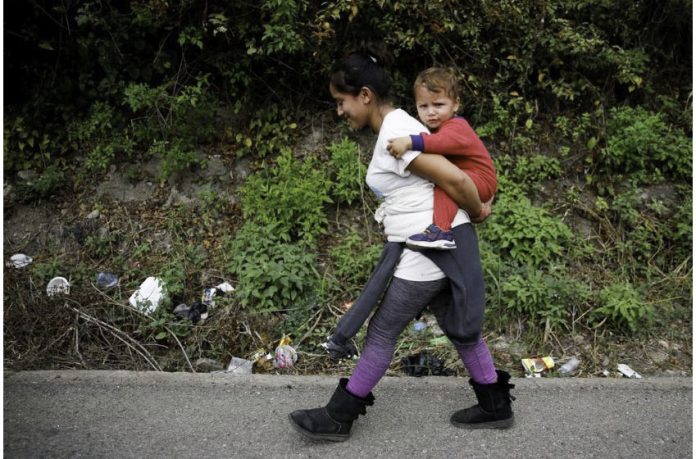Almost a month ago the federal government announced a temporary closure of the southern border to nonessential traffic. This week, the White House announced that Mexico, Honduras and Guatemala would deploy troops “to make crossing the borders more difficult.”
Yet migrants continue to stream into the country en route to the United States.
According to a report published Wednesday by The Guardian, Central American migrants were crossing into Mexico on a recent morning at Frontera Corozal, a remote border town on the Usumacinta River in Chiapas, without having to show documents to anyone.
The newspaper said the situation “looked like business as usual,” noting that groups of men, women and children were disembarking from boats onto Mexican soil before getting into taxis and speeding past an immigration office to a crossroads. There they boarded vans for the next leg of their journey north: an approximately 150-kilometer trip to the town of Palenque, Chiapas.
There are police checkpoints on the Frontera Corozal-Palenque highway, but according to migrants, they were able to pass by paying — or were robbed by the officers they encountered.
“They’ve taken our money, and now we’re dead broke,” 27-year-old Christian, part of a group of Honduran construction workers, told The Guardian.
“And now we have to deal with the military. We need to figure out how we get north. We are always fighting and figuring out a way to get there.”
Shortly after he took office in late 2018, President López Obrador pledged to clean up Mexico’s immigration and customs forces, which he said were “rotten to the core.” He also vowed that his administration would treat migrants with respect and give them protection.
But human rights activists say that soldiers, police officers and immigration officials continue to commit crimes against migrants, including robbery, extortion and kidnapping.
“It’s a cartel,” said Gabriel Romero, director of a migrant shelter near Mexico’s border with Guatemala. “They [the authorities] are acting in cahoots with [smugglers] … with taxi and bus drivers. It’s a network taking advantage of migrants,” he said.
Still, migrants fleeing poverty and violence in countries such as Honduras, El Salvador and Guatemala are prepared to risk their lives in their quest to reach the United States.

Even increased enforcement — the government deployed the National Guard in 2019 to stem migration flows and thus appease then United States president Donald Trump — failed to stop Central Americans and people from more distant countries, including Haiti, Cuba and even African nations, from attempting to reach the United States via a long journey that includes crossing Mexico’s southern border.
Crackdowns instead have forced migrants to take riskier, more remote routes to enter and travel through Mexico. They are consequently exposed to an even greater risk of becoming victims of crimes such as robbery, rape, abduction and murder.
The latest crackdown on migrants may be even less effective in stopping the flows of people, according to Tonatiuh Guillén, a former chief of Mexico’s National Immigration Institute who resigned in 2019 after the federal government buckled in the face of Trump’s threat to impose blanket tariffs on Mexican goods if the country didn’t do more to curb migration.
“The flow of migrants will continue moving, mostly because they’re in small groups … and a significant part of it is controlled by human traffickers,” he said.
“[Human traffickers] have infrastructure, money and complicit relationships [with the authorities],” Guillén said.
“[In addition] governments in Mexico, the United States and Central America have never really put much of an effort into controlling these trafficking organizations.”
López Obrador and United States Vice President Kamala Harris, who is leading the U.S. government’s efforts to deter migration, spoke last week. López Obrador said the two countries are “willing to join forces in the fight against human trafficking and to protect human rights, especially of children.”
The president and vice president also said they would work toward Central American development and agreed on the urgency of carrying out emergency humanitarian aid programs.
However, it is unlikely that any measures agreed to by the Mexican and U.S. governments will significantly diminish the various factors pushing Central Americans to flee their homelands.
According to The Guardian report, migrants traveling through southern Mexico said they had escaped situations of extreme poverty, hunger and gang violence. They also spoke of the dire consequences of drought and hurricanes and criticized politicians who allow corruption to run rampant.
“Hurricane Eta swept away everything and left us in the street with our children,” said 34-year-old Leticia, who fled Honduras with her husband and three children. “That’s why we decided to leave and search for a future.”
Johan Martínez told The Guardian that he left Honduras because criminals were forcing him to make extortion payments even though his income as a welder was meager.
After showing the newspaper’s reporter a gunshot scar on his abdomen and his fake front teeth that replaced those knocked out by angry gangsters seeking payment, Martínez said that the arrival of United States President Joe Biden, who has moved to roll back some of his predecessor’s harsh immigration policies, gave him the “opportunity of a lifetime” to seek asylum in the U.S.
Many other Central Americans, who have flocked to the Mexico-U.S. border in recent months, feel the same.
Source: The Guardian (en)
